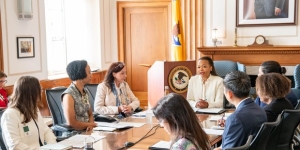Speech
Assistant Attorney General Kristen Clarke Delivers Remarks at the Emanuel Nine Humanitarian Awards
Location
Charleston, SC
United States
Remarks as Prepared for Delivery
You undoubtedly have heard accounts of the shootings on June 17, 2015, many, many times. I will not put you through another recitation. But there is one aspect of that night I want to highlight. When Dylan Roof came to Mother Emanuel Church on June 17, the church leaders and parishioners did not know him. He was a stranger. A scruffy 21-year-old white man, a stranger, showed up unannounced at the Fellowship Hall for the Bible Study, and without reservation, they invited him to join their worship. They followed the edict in Leviticus,
“The stranger who resides with you shall be to you as the native among you,
and you shall love him as yourself, for you were strangers in the land of
Egypt.”
The generosity of these unfortunate victims, their humanity and kindness, tells us that these were good, decent people who lived according to their faith – and died in its embrace.
I am reminded of a beautiful and inspiring book with a title that perfectly describes the tragic events of that night. The book is called When Bad Things Happen to Good People by Rabbi Harold Kushner. Religious and lay leaders of all faiths have praised the book and relied on its lessons.
Kushner tells us that tragedy is part of the human condition. But each of us can decide our response to it, in the strength we muster, the kindness we exercise, the communities we forge. Kushner says that when “suffering and death in someone close to us bring us to explore the limits of our capacity for strength and love and cheerfulness, when it leads us to discover sources of consolation we never knew before, then we make [that loved one] into a witness for the affirmation of life rather than its rejection.”
That is what the people honored here today have done. Each of them has shown unstinting devotion to the families of the victims of the shooting and to the broader community affected by this tragic event. They have come together, they have helped the community come together, to celebrate and remember the Emanuel Nine. They have supported a memorial foundation, hosted events commemorating the victims – including a “forum of forgiveness” – labored to strengthen this church and promote its good works, and even consoled us with poetry. The words of poet and honoree Markus Amaker both express the grief of the community and inspire the fortitude not just to carry on, but to unite, to elevate ourselves and those around us. He writes in the poem Black Cloth,
Charleston,
I see heaven in your tears and feel the weight of sadness
in your voice. I’ve seen strangers hold hands
as the sun wraps us in unbearable heat,
I’ve watched children of contradiction come together
for the unity of the Holy City.
By their words, their deeds, and their humanitarian spirit, all of the honorees have made the victims of this tragic shooting into witnesses for the affirmation of life rather than its rejection.
I am proud to lead the Civil Rights Division of the U.S. Department of Justice where every day, our team is working to respond to unlawful acts of hate in a way that seeks to honor the victims, support their loved ones, and bind their communities together. We prosecute the perpetrators of hate crimes. Since January 2021, we have charged more than 80 defendants in more than 70 cases. In that period, we have obtained more than 65 convictions. We prosecuted and convicted Dylann Roof. We are currently prosecuting the man who killed 10 Black people in a racist mass shooting in Buffalo, New York. We obtained a conviction of a Montana man for shootings intended to rid his town of LGBTQ people and won guilty verdicts against the three men who murdered Ahmaud Arbery just because he was Black.
In these and other hate crime prosecutions, we seek justice — but not only justice. We seek to deter hate crimes, to prevent anyone from living in fear that when they go to church, to work, or to the store, they will be attacked merely because of how they look, where they are from, the way they worship, or who they love.
We seek also to remedy the harms that hate crimes cause, to reaffirm the intrinsic value and dignity of every person, to re-knit the shattered bonds of community and restore the members’ sense of freedom and security. We seek to broadcast a powerful message that the people affected by hate crimes and their communities are valued, and that the department will not stand idly by when they are targeted.
This effort requires more than prosecutions. That is why the department is also focused on non-criminal acts of bias in our schools, neighborhoods and workplaces. And it is why we focus as well on education and awareness. Across the country, we are locking arms with U.S. Attorneys’ offices, community groups and more in a program called United Against Hate, teaching community members how to identify, report, and help prevent hate crimes and building trust between law enforcement and communities.
There are many ways to respond to hate. In the face of tragedy, in the face of hate, each person must find their own path. We each must summon our strength, marshal our talents, to respond in our own way, to affirm life, and to value human dignity. The honorees today have done that. They have helped the families of the Emanuel Nine and the broader community. In doing so, they have inspired us, restored us, and won our enduring gratitude.
As I close, I want to recognize U.S. Attorney Adair Burroughs and other officials with us today.
Topics
Civil Rights
Hate Crimes
Updated June 23, 2023

 U.S. Department
of Justice
U.S. Department
of Justice
